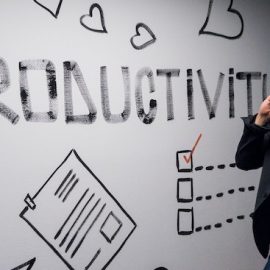

This article is an excerpt from the Shortform book guide to "The Asshole Survival Guide" by Robert I. Sutton. Shortform has the world's best summaries and analyses of books you should be reading.
Like this article? Sign up for a free trial here.
Do any of your coworkers disrespect you? Do they make you dread going to work?
In The Asshole Survival Guide, organizational psychologist Robert I. Sutton explains how to identify assholes at work. He also discusses three research-backed ways their behavior hurts the people around them.
Continue reading for Sutton’s valuable insights.
Identifying Assholes at Work
According to Sutton, you can encounter people who disrespect others anywhere, but these patterns are especially prevalent in the workplace. He defines these “assholes” as people who regularly make you or someone else feel degraded, downtrodden, or otherwise upset.
(Shortform note: Some social psychologists classify assholes at work into five types. First, some kiss up to superiors and tear down their peers to get ahead. Second, others are overly assertive, taking over meetings and stealing the spotlight from others. These people strong-arm others into agreeing with their ideas. The third type is gaslighters who seek power by manipulating, lying, and chipping away at others’ self-esteem. They typically isolate their victims socially. Fourth, you might run into someone who seems trustworthy at first but then steals credit from you when you’re in front of a group. Finally, some assholes are micromanagers with poor personal boundaries and unrealistic expectations.)
However, Sutton adds that there’s no single set of traits or behaviors that fit this definition. Everyone has different things that bother them, so a person you perceive as an asshole may seem benign to someone else. For example, one person might find it offensive that their colleague always enters the office without saying hello to them, but another person might not even notice.
(Shortform note: When you think someone’s an asshole and others don’t, consider whether they’re truly an asshole, or just different from you. A lot of social psychology research suggests that we tend to get along with and like people who are similar to us. Similarities can come from our interests, values, personal background, and so on. This principle also applies at work: We tend to work better with people like us because we share their communication style, way of thinking, and attitude. Therefore, someone who seems like an asshole may just think or communicate differently than you.)
The Impact of Assholes at Work
According to Sutton, some people think you need to be an asshole to be successful at work. They believe it’s every person for themselves, and you have to tear others down to get ahead. However, in almost every situation, disrespecting others just makes you an unpleasant person to be around. Additionally, there are many negative consequences of asshole behavior for the people who are direct victims of it.
(Shortform note: Results from several studies suggest that nice and agreeable people are just as likely to attain power as disagreeable people who exhibit selfish, combative, and manipulative personality traits. Additionally, being an asshole doesn’t help people get ahead faster than others—any leg up in power they get is counterbalanced by their weak and negative connections with others. Finally, nice people in high positions generally are better leaders than assholes.)
Extensive research shows that three consequences may occur when you’re exposed to assholes at work:
Consequence #1: Damaged Mental and Physical Health
The author cites ample research suggesting that being around an asshole at work can profoundly damage your mental and physical health. These effects may include the following:
- High blood pressure
- Anxiety and depression
- Sleep issues
| The Links Between Asshole Behavior, Chronic Stress, and Health Problems Exposure to workplace assholes leads to the above issues because it keeps you in your body’s stress response. When subjected to perceived danger (such as an asshole’s intimidation), your body releases stress hormones that prompt physiological processes designed to help you respond quicker to the danger. For instance, your heart beats faster, breathing quickens, pupils dilate, and muscles tense. When you’re in serious short-term danger, this can be a life-saving response. However, when the stress trigger is ever-present and you stay in this state for too long, it wears on your body. Many studies support Sutton’s assertion that chronic stress leads to high blood pressure. Over time, consistently high blood pressure damages your cardiovascular system by making your heart and blood vessels work too hard, leading to heart disease and poor long-term health. Additionally, some research indicates that chronic stress leads to depression, anxiety, and even addiction because it changes the structure of your brain. Chronic stress can prompt your body to produce more white matter (the connective tissue of the brain responsible for communicating information) and produce less gray matter (which governs problem-solving and decision-making). This imbalance leaves you more susceptible to mental illness. Finally, when experiencing stress-induced insomnia, you’ll also likely experience fatigue, cognitive impairment, irritability, and excessive daytime sleepiness—all things that hinder your ability to perform well at your job. |
Consequence #2: A Toxic Work Environment
According to Sutton, having an asshole around often leads to more people becoming assholes in the workplace. Asshole behavior sows mistrust, lessens motivation, and prompts more serious issues like absenteeism.
(Shortform note: Some research suggests that workplace asshole behavior is especially contagious when the boss is the asshole. About one in four people who are discourteous at work are taking cues from their boss’s behavior. In some cases, supervisors may even encourage their employees to be rude to each other. Your company can prevent these patterns by setting standards for civility and implementing training programs for management that focus on courteous behavior. This can only help business—workers who feel valued and respected are more likely to stay longer at the same job, come to work consistently, and produce quality work more efficiently.)
Consequence #3: It’s Harder to Do Your Job Well
According to Sutton, studies suggest that people who experience degradation at work have a decreased ability to perform their jobs well. In this situation, you’re less likely to be productive and creative. Additionally, you may find it more difficult to make good decisions, and you likely won’t be as willing to put in extra effort to finish projects or assist coworkers.
(Shortform note: All of the issues Sutton describes here come down to employee motivation, which many experts say businesses should prioritize. When people are treated poorly at work, they feel less motivated to work hard, think outside the box, and work collaboratively because they don’t feel like they’re working toward anything valuable. Some research suggests that employees are 16 times more engaged when they have a positive work experience. This is good for business because it increases retention, which saves companies a lot of money—the cost to replace an employee can be between one-half and two times the employee’s salary.)

———End of Preview———
Like what you just read? Read the rest of the world's best book summary and analysis of Robert I. Sutton's "The Asshole Survival Guide" at Shortform.
Here's what you'll find in our full The Asshole Survival Guide summary:
- Wisdom for dealing with jerks in the workplace
- How to take away a jerk's power and lessen their effect on you
- The psychology behind rude and mean behavior






